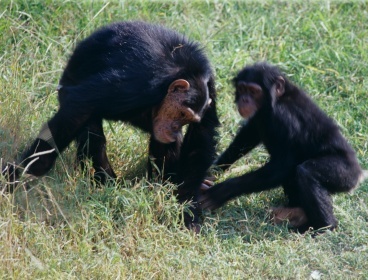
Scientists have revealed that certain members in a chimpanzee group act as an impartial “police” to mediate conflicts and preserve peace, Science Daily and livescience.com reported Wednesday.
Animal groups handle conflicts in a variety of ways, but the arbiters in chimps, gorillas, orangutans and other primate group were neither biased nor aggressive. The arbiters did not support allies or punish wrongdoers.
Primatologists from the University of Zurich in Switzerland analyzed four different chimpanzee groups for nearly 600 hours over two years.
During this period, introduction of new females caused rift within the group, causing power struggle.
Scientists monitored the social interactions and conflicts and found that certain individuals, usually a high-ranking male or female, acted as peacemakers.
The researchers initially thought that high ranking “police” members wanted to keep themselves dominant or sought to prevent potential mates from leaving the group.
In order for this hypothesis to be true, however, all policing apes needed to be males, for female chimps to not fight over ranks and female members are the most likely to leave the group. In contrast, found policing behavior was found in both sexes.
Also the arbitrators were more likely to intervene when conflict within the group was larger and more members of the group were involved.
This caused scientists to believe the motivation for police chimps is the stability of group. Resolving quarrel tend to lead to healthy living environment for the primates.
"The interest in community concern that is highly developed in us humans and forms the basis for our moral behavior is deeply rooted. It can also be observed in our closest relatives," explained Claudia Rudolf von Rohr, the lead author of the study.
<한글 기사>
침팬지들에게도 ‘경찰’ 있다
침팬지, 고릴라, 오랑우탄 등 유인원 집단 내에서도 경찰처럼 싸움이나 의견충돌을 중재하는 역할을 하는 구성원이 존재한다고, 사이언스 데일리와 라이브사이언스닷컴이 7일 (현지시간) 보도했다.
동물 집단들 내에서 분쟁을 제제하는 경우는 흔하지만, 유인원 집단의 경우 친한 동료의 편을 들거나 잘못을 저지른 구성원을 벌하는 등 편견이나 폭력 없이 중재자의 역할을 해낸다고 관찰되었다.
클로디아 루돌프 본 로르가 이끄는 스위스 취리히 대학의 연구진은 2년간 600시간에 걸쳐 침팬지 집단 넷을 관찰했다.
이 기간 동안, 새로운 암컷들이 집단 내에 들어오면서 서열다툼이 생겼는데, 이 경우 주로 서열이 높은 수컷이나 암컷이 중재자 역할을 하였다.
연구진은 처음에 이 침팬지 “경찰”들이 분쟁을 없애면서 스스로의 서열을 확고히 하거나 잠재적 짝짓기 상대가 집단을 떠나는 것을 막으려 한다고 생각했다.
그러나 이 가설은 틀린 것으로 곧 드러났다. 암컷들은 서열 다툼을 하지 않고 집단을 떠나는 것은 주로 암컷이기 때문에, 이 가설이 성립하기 위해선 중재자들이 모두 수컷이어야 하는데 암컷과 수컷 중재자가 모두 존재했기 때문이다.
연구진은 또한, 분쟁의 규모가 크고 관련된 구성원들의 수가 많을수록 중재자들이 적극적으로 싸움을 막으려 한다는 것을 알게 되었다.
그 결과, 중재자 침팬지들의 목적은 집단 내의 안정을 확보하면서 바람직한 생활환경을 만드는 것이라고 연구진은 추정했다.
“집단에게 중요한 일들에 관심을 갖는 것은 상당히 잘 발달되어 있는 인간들의 습성이고, 도덕적 행동의 근간이 됩니다. 그리고 이는 우리의 가장 가까운 친척(유인원)들에게서 찾아볼 수 있습니다,” 로르는 설명했다.









![[Kim Seong-kon] Democracy and the future of South Korea](http://res.heraldm.com/phpwas/restmb_idxmake.php?idx=644&simg=/content/image/2024/04/16/20240416050802_0.jpg&u=)







![[KH Explains] Hyundai's full hybrid edge to pay off amid slow transition to pure EVs](http://res.heraldm.com/phpwas/restmb_idxmake.php?idx=652&simg=/content/image/2024/04/18/20240418050645_0.jpg&u=20240418181020)

![[Today’s K-pop] Zico drops snippet of collaboration with Jennie](http://res.heraldm.com/phpwas/restmb_idxmake.php?idx=642&simg=/content/image/2024/04/18/20240418050702_0.jpg&u=)